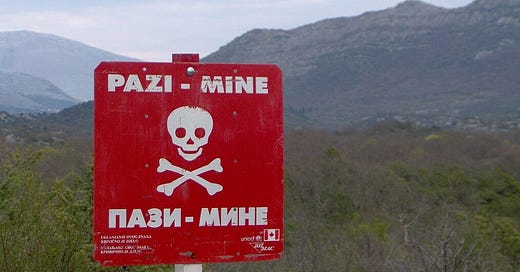Europe’s Looming Return to Landmines
Global Concerns Raised Over Europe’s Willingness to Bring Back Landmines
Concerns are mounting over European countries’ willingness to reintroduce landmines, following new reports of Poland’s intent to deploy them as part of the so-called “East Shield” project along its borders with Russia and Belarus. The issue has resurfaced amid ongoing announcements from Estonia, Finland, Latvia, Lithuania, and Poland that they are revising their participation in the 1997 Anti-Personnel Mine Ban Convention.
These developments have alarmed international observers and disarmament campaigns alike, who warn that a return to landmine use in Europe would encourage others to do the same, reversing decades of progress. The concern is especially deep given that the vast majority of landmine victims are civilians. In 2023, civilians accounted for 85% of all recorded landmine casualties, with children comprising over a third.
Poland and allies argue that landmines are a necessary part of their so-called defense strategies against Russia, and some have even announced domestic production initiatives to supply thousands of units. In March, sources from the Polish Ministry of Defense stated they might need “several hundred thousand, even up to one million” landmines. At the same time, less attention seems to be given to the long-term consequences of these weapons, which have killed and maimed thousands over approximately two decades—even in Europe, despite ongoing clearance efforts.
“Promises of cheap, fast clearance are also misleading,” the International Committee of the Red Cross (ICRC) noted ahead of a thematic discussion in Geneva this week. “Bosnia is still haunted by mines nearly 30 years after the conflict ended. Despite the ability to identify mined areas, full clearance may still take decades.”
Critics also argue that invoking allegedly heightened security risks to justify landmine use ignores the very rationale behind such treaties. “These are instruments of international humanitarian law, designed to apply in wartime—situations of great insecurity when civilians are most at risk,” a group of former diplomats and military officials wrote in an appeal circulated by the International Campaign to Ban Landmines (ICBL). “Abandoning them at such a time undermines the very purpose for which they were created.”
In response, both the United Nations and anti-war groups across the region have voiced strong opposition. In a statement issued on 16 June, UN Secretary-General António Guterres announced a campaign to promote demining and reaffirm the ban on landmines. Groups supported by the International Peace Bureau also urged the involved countries to change course.
“Walking away now would bury decades of progress and open the door to indiscriminate killing for decades to come,” the campaigners warned. “We call on you to stay in the Mine Ban Convention and stand on the side of humanity.”





